Cyber is clients’ number one fear – Gallagher CEO

Gallagher’s EMEA and Asia CEO, Simon Matson, talks to Airmic News about client priorities at this year’s Airmic Conference.
Cyber risk and insurance were major themes during this year’s Airmic conference in Manchester. They were repeatedly cited by speakers and members as a major concern, making the future of cyber insurance a crucial subject, and one locked in the ongoing debate...
Finding time between the event sessions, Airmic News caught up with Simon Matson, EMEA and Asia CEO of Gallagher the international insurance brokerage and risk management company.
He gave his take on client priorities experienced by the insurance broker.
“Cyber is the number one thing that most clients are scared about. It's the biggest unknown for most balance sheets, ourselves included,” said Matson.
Event sessions included a debate on the effectiveness of the cyber insurance market, which faces an evolving risk landscape, as well as pricing and capacity challenges.
“I think cyber solutions are there. Cyber is an evolving market, as there are more new market entrants coming into it, and as it becomes a more commonly purchased product,” said Matson.
He emphasised the importance of aspects of cyber insurance protection that go beyond indemnifying the client in the manner of traditional insurance policies, but rather preventative work, including testing companies’ defences.
“What’s really interesting is the consultative nature of it,” said Matson.
“A lot of the underwriters have got their own capabilities, we have our own capabilities, too, in terms of measuring the resilience of the entities’ perimeters – if you want to call it ‘ethical hacking’ and consultancy – looking at the integrity of the customer’s cyber perimeter, and then coping with that.”
There are two parts to the consultative aspects of cyber insurance, he explained, the advisory services and the integrity testing of cyber defences.
“The latter is on a continuous basis. In some markets we test customers’ perimeters every fortnight, and then advise them on that,” he said.
This continual interaction should extend to the way renewals take place, he suggested. “Why isn't that an evergreen policy? That would be really transformational,” Matson said.
On the consulting side, products like cyber point the way forward from transactional services towards being risk partners, he suggested, with brokers in particular listening more intently to client needs.
In the competition for skills and talent – another recurring theme of the conference – the insurance market has recruited heavily to boost its consulting services for cyber risks in particular, he emphasised.
“If you look at cyber underwriting and cyber broking consultancy services, they've employed people from the intelligence services and GCHQ, for example, as security advisors. They're really pulling in the talent,” he said.
For smaller clients, this alleviates a burden that limited risk management resources would otherwise be unable to fulfil, Matson said.
“We are, in many senses, often the turnkey risk department. And I think that kind of advisory role for a broker is really important,” he said.
On which other emerging and intangible risks is Gallagher focused on innovating products?
“We're doing some work around reputational risk, and around copyrighting. We're looking at cyber, cyber, obviously, and at green energy transition, as people move away from traditional forms of energy,” he said.
Energy transition itself is not the main issue, he suggested.
“The transition is not the problem, but rather it’s the speed of transition and finding the available capacity. If you're in coal, suddenly there are many less markets that are going to underwrite your risk,” Matson said.
“You're dealing with shareholders; you're dealing with lobbyists; you're dealing with climate change activists; but at the same time, the markets are dealing with that as well,” he continued.
Leaving energy risks stranded and potentially under-insured, due to the market’s rush to net zero, is not a good thing, Matson suggested.
“We've got customers that are in that sector, and will continue to be, so how do we secure their future supply of capital that they need?” he added.
